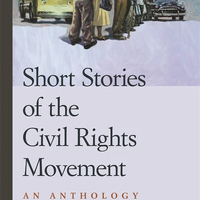Short Stories of the Civil Rights Movement: An Anthology
Item
-
Title
-
Short Stories of the Civil Rights Movement: An Anthology
-
This edition
-
"Short Stories of the Civil Rights Movement: An Anthology". Ed. Margaret Earley Whitt. Athens: University of Georgia Press, 2006. 343 pp.
-
Table of contents
-
[names with an asterisk (*) are not African Americans]
*Margaret Earley Whitt / Introduction
School Desegregation:
James W. Thompson / See What Tomorrow Brings (1968)
*R. V. Cassill / The First Day of School (1958)
Diane Oliver / Neighbors (1966)
*Joan Williams / Spring Is Now (1968)
Sit-Ins:
*Joanne Leedom-Ackerman / The Beginning of Violence (1985)
*Lee Martin / The Welcome Table (1996)
Anthony Grooms / Food That Pleases, Food to Take Home (1995)
Mike Thelwell / Direct Action (1963)
Z. Z. Packer / Doris Is Coming (2003)
Marches and Demonstrations:
Anthony Grooms / Negro Progress (1994)
Henry Dumas / The Marchers (1979)
Alma Jean Billingslea-Brown / Moonshot (1989)
*Natalie L. M. Petesch / Selma (1972)
*John Updike / Marching through Boston (1966)
Acts of Violence:
Lerone Bennett, Jr. / The Convert (1963)
*Eudora Welty / Where Is the Voice Coming from? (1963)
Junius Edwards / Liars Don't Qualify (1961)
Alice Walker / Advancing Luna--and Ida B Wells (1977)
*Rosellen Brown / Means and Ends (1985)
James Baldwin / Going to Meet the Man (1965)
Retrospective:
Anthony Grooms / Flora Devine (1995)
*Val Coleman / Paying My Dues (1996)
Alice Walker / To My Young Husband (2000)
Brief Chronology of the Civil Rights Movement
-
About the anthology
-
Over half of the authors in this anthology are African American, so the anthology is included in this project, though the volume is not designed to be an anthology of African American writing only.
-
Publisher's description
-
"During the civil rights era, masses of people marched in the streets, boycotted stores, and registered to vote. Others challenged racism in ways more solitary but no less life changing. These twenty-three stories give a voice to the nameless, ordinary citizens without whom the movement would have failed. From bloody melees at public lunch counters to anxious musings at the family dinner table, the diverse experiences depicted in this anthology make the civil rights movement as real and immediate as the best histories and memoirs.
Each story focuses on a particular, sometimes private, moment in the historic struggle for social justice in America. Events have a permanent effect on characters, like the white girl in "Spring Is Now" who must sort through her feelings about the only black boy in her school, or the black preacher in "The Convert" who tells a friend, "This thing of being a man . . . The Supreme Court can't make you a man. The NAACP can't do it. God Almighty can do a lot, but even He can't do it. Ain't nobody can do it but you." If a character survives--and some do not--the event can become a turning point, a vision for a better world.
The sections into which the stories are grouped parallel the news headlines of the day: School Desegregation (1954 on), Sit-ins (1960 on), Marches and Demonstrations (1963 on), and Acts of Violence. In the last section, Retrospective, characters look back on their personal involvement with the movement. Twenty writers--eleven black and nine white--are represented in the collection. Ten stories were written during the 1960s. That the others were written long after the movement's heyday suggests the potency of that time as a continuing source of creative inspiration."
-
Item Number
-
A0614
 Front cover
Front cover